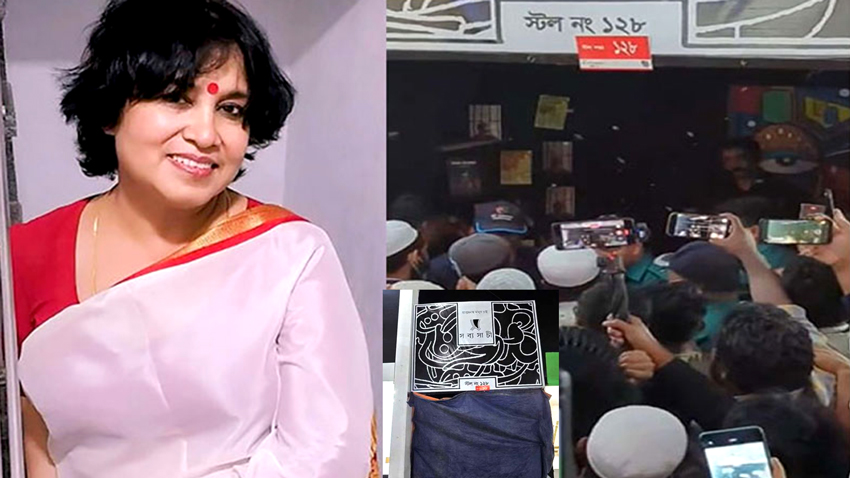On Monday evening, the usually tranquil Amar Ekushey Book Fair in Dhaka turned chaotic when protests erupted at the Sabyasachi publication stall. The protesters were incensed by the sale of books authored by Taslima Nasrin, a writer who has long been a lightning rod for controversy in Bangladesh. The incident underscores a worrying trend of mob culture in the country, where collective outrage often manifests in sudden and violent actions.
The incident unfolded dramatically with writer Shatabdi Vobo at the heart of the turmoil. As agitated protesters vehemently objected to Nasrin’s works, a heated argument ensued. In a bid to pacify the crowd, Shatabdi chanted “Joy Bangla”, but this act only added fuel to the fire. The situation quickly escalated into a frenzied attempt by the protesters to assault Shatabdi, prompting immediate police intervention. The law enforcement officers swiftly escorted Shatabdi from the premises and temporarily closed the stall to prevent further escalation. Following a thorough discussion with Bangla Academy authorities, the stall was reopened.
However, the decision regarding the continued sale of Nasrin’s books remains pending and will be determined after further deliberations with the book fair committee.
This incident is emblematic of the broader issue of mob culture in Bangladesh. Similar to a wildfire, mob mentality can ignite unexpectedly and spread rapidly, fueled by collective emotions and social media amplification. This mentality often results in spontaneous and sometimes violent actions, undermining the very essence of civil discourse.
In recent times, Bangladesh has witnessed several incidents where mobs have taken the law into their own hands, often with tragic consequences. In a society where formal channels for grievances may be perceived as ineffective or inaccessible, collective action can seem like the only viable option. Social media also plays a significant role, amplifying outrage and facilitating the rapid mobilization of groups.
The Amar Ekushey Book Fair incident brings to light the delicate balance between freedom of expression and respect for community sensitivities. Taslima Nasrin’s works have always been contentious, but the violent reaction to their presence at a literary fair raises critical questions.
How can society ensure diverse viewpoints are represented while also respecting the sentiments of different groups?
The incident has stirred considerable commotion in civil society. Some believe that Taslima Nasrin’s intent was not merely to sell books but to establish a narrative. She successfully found the content to support that narrative. The situation at the book fair, where extremists and fundamentalists threatened the stall and called for her books to be banned, has become the centerpiece of this narrative. Nasrin has long been a figure used by the Indian media to propagate specific agendas, and this incident provides yet another opportunity for them to amplify their propaganda.
The decision on whether to allow the sale of banned books or the works of banned authors at the book fair rests with the state and the implementation committee of the fair. There were appropriate channels for raising concerns, protesting, and lodging complaints with the Bangla Academy. However, certain extremist groups prefer radical actions over civil discourse. Their response is to resort to violence, with calls to dismantle stalls and physically assault individuals.
The fair committee should have issued clear guidelines regarding the sale of banned books from the outset. The damage has already been done. If the books or the Sabyasachi stall are now banned, it will only strengthen the narrative that this decision was made under pressure from Islamist groups. Much like the government’s ambiguous stance on the issue of the Dhanmondi-32 demolition, any delayed and regretful statement will not suffice. No one desires the failure of this government, yet it appears to be making efforts towards its own downfall.
As the Amar Ekushey Book Fair continues, organizers and authorities face the challenge of maintaining an environment that is both inclusive and secure. This incident serves as a powerful reminder of the ongoing struggle to uphold the principles of free expression while navigating the complexities of societal sensitivities. For Bangladesh, the path forward lies in fostering a culture where differences are not merely tolerated but celebrated. It is through dialogue and mutual respect that society can truly thrive.
LAM-YA TASNIM works at Central Foundation for International and Strategic Studies (CFISS)


